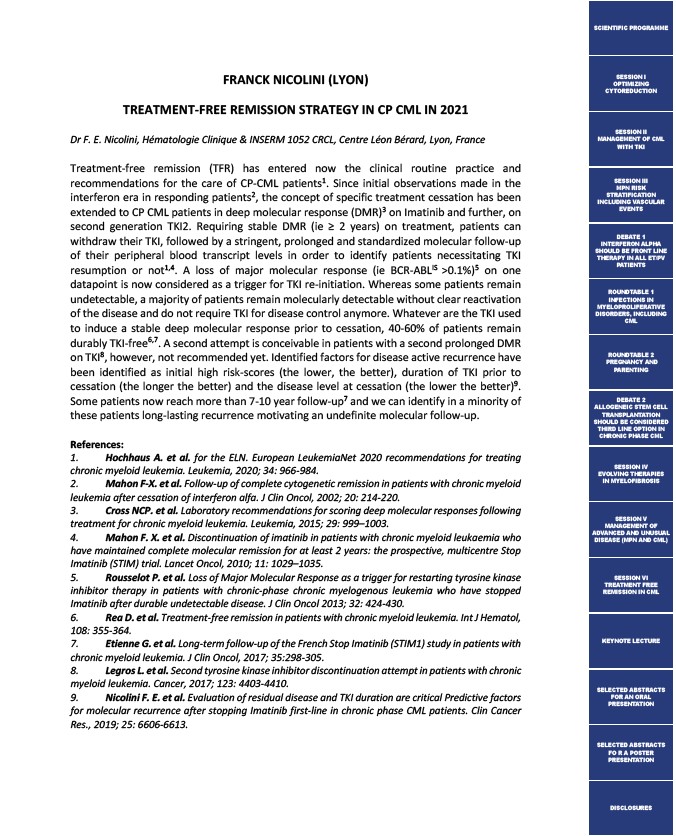
FRANCK NICOLINI (LYON)
TREATMENT-FREE REMISSION STRATEGY IN CP CML IN 2021
Dr F. E. Nicolini, Hématologie Clinique & INSERM 1052 CRCL, Centre Léon Bérard, Lyon, France
Treatment-free remission (TFR) has entered now the clinical routine practice and
recommendations for the care of CP-CML patients1. Since initial observations made in the
interferon era in responding patients2, the concept of specific treatment cessation has been
extended to CP CML patients in deep molecular response (DMR)3 on Imatinib and further, on
second generation TKI2. Requiring stable DMR (ie ≥ 2 years) on treatment, patients can
withdraw their TKI, followed by a stringent, prolonged and standardized molecular follow-up
of their peripheral blood transcript levels in order to identify patients necessitating TKI
resumption or not1,4. A loss of major molecular response (ie BCR-ABLIS >0.1%)5 on one
datapoint is now considered as a trigger for TKI re-initiation. Whereas some patients remain
undetectable, a majority of patients remain molecularly detectable without clear reactivation
of the disease and do not require TKI for disease control anymore. Whatever are the TKI used
to induce a stable deep molecular response prior to cessation, 40-60% of patients remain
durably TKI-free6,7. A second attempt is conceivable in patients with a second prolonged DMR
on TKI8, however, not recommended yet. Identified factors for disease active recurrence have
been identified as initial high risk-scores (the lower, the better), duration of TKI prior to
cessation (the longer the better) and the disease level at cessation (the lower the better)9.
Some patients now reach more than 7-10 year follow-up7 and we can identify in a minority of
these patients long-lasting recurrence motivating an undefinite molecular follow-up.
References:
1. Hochhaus A. et al. for the ELN. European LeukemiaNet 2020 recommendations for treating
chronic myeloid leukemia. Leukemia, 2020; 34: 966-984.
2. Mahon F-X. et al. Follow-up of complete cytogenetic remission in patients with chronic myeloid
leukemia after cessation of interferon alfa. J Clin Oncol, 2002; 20: 214-220.
3. Cross NCP. et al. Laboratory recommendations for scoring deep molecular responses following
treatment for chronic myeloid leukemia. Leukemia, 2015; 29: 999–1003.
4. Mahon F. X. et al. Discontinuation of imatinib in patients with chronic myeloid leukaemia who
have maintained complete molecular remission for at least 2 years: the prospective, multicentre Stop
Imatinib (STIM) trial. Lancet Oncol, 2010; 11: 1029–1035.
5. Rousselot P. et al. Loss of Major Molecular Response as a trigger for restarting tyrosine kinase
inhibitor therapy in patients with chronic-phase chronic myelogenous leukemia who have stopped
Imatinib after durable undetectable disease. J Clin Oncol 2013; 32: 424-430.
6. Rea D. et al. Treatment-free remission in patients with chronic myeloid leukemia. Int J Hematol,
108: 355-364.
7. Etienne G. et al. Long-term follow-up of the French Stop Imatinib (STIM1) study in patients with
chronic myeloid leukemia. J Clin Oncol, 2017; 35:298-305.
8. Legros L. et al. Second tyrosine kinase inhibitor discontinuation attempt in patients with chronic
myeloid leukemia. Cancer, 2017; 123: 4403-4410.
9. Nicolini F. E. et al. Evaluation of residual disease and TKI duration are critical Predictive factors
for molecular recurrence after stopping Imatinib first-line in chronic phase CML patients. Clin Cancer
Res., 2019; 25: 6606-6613.
SCIENTIFIC PROGRAMME
SESSION I
OPTIMIZING
CYTOREDUCTION
SESSION II
MANAGEMENT OF CML
WITH TKI
SESSION III
MPN RISK
STRATIFICATION
INCLUDING VASCULAR
EVENTS
DEBATE 1
INTERFERON ALPHA
SHOULD BE FRONT LINE
THERAPY IN ALL ET/PV
PATIENTS
ROUNDTABLE 1
INFECTIONS IN
MYELOPROLIFERATIVE
DISORDERS, INCLUDING
CML
ROUNDTABLE 2
PREGNANCY AND
PARENTING
DEBATE 2
ALLOGENEIC STEM CELL
TRANSPLANTATION
SHOULD BE CONSIDERED
THIRD LINE OPTION IN
CHRONIC PHASE CML
SESSION IV
EVOLVING THERAPIES
IN MYELOFIBROSIS
SESSION V
MANAGEMENT OF
ADVANCED AND UNUSUAL
DISEASE (MPN AND CML)
SESSION VI
TREATMENT FREE
REMISSION IN CML
KEYNOTE LECTURE
SELECTED ABSTRACTS
FOR AN ORAL
PRESENTATION
SELECTED ABSTRACTS
FO R A POSTER
PRESENTATION
DISCLOSURES